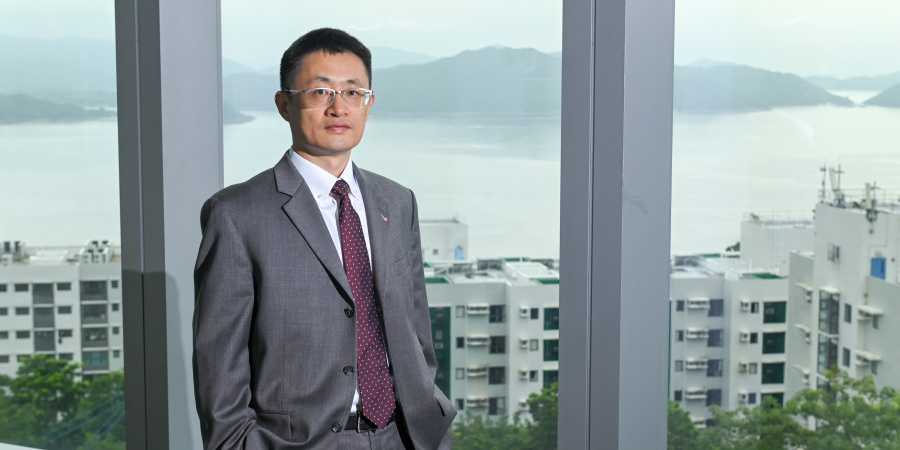Creating an Environment Where the Sustainable Is Attainable
As a pioneering electrochemist and Head of the Department of Chemical and Biological Engineering, Prof. SHAO Minhua is accelerating the clean energy transition and seeking to fast forward top faculty and young talents in making their own contribution to a resource-friendly world.
Listening to the news on sustainability and net-zero can be a test for the sturdiest optimist these days. However, listening to Prof. Shao Minhua, Head and Chair Professor of Chemical and Biological Engineering (CBE), Director of the HKUST Energy Institute, and Cheong Ying Chan Professor of Energy Engineering and Environment, brings the huge and complex global challenge back down to the do-able for each person to make a difference. “The sustainability big picture is certainly really, really big. But I just try to do what I can and what I’m good at. If I can contribute a little bit, then I’m proud of this.”
Energizing positive change
In fact, Prof. Shao’s individual efforts are actively driving a range of endeavors with major impact potential for a greener world and improved lives. The globally recognized electrochemist’s research is powering significant new understanding and applications to spur the clean energy transition in transportation, including leading advances in high-performance, durable, cost-effective hydrogen fuel cells and solid-state lithium batteries with energy densities over 400 watt-hours per kilogram (Wh/kg) for electric vehicles beyond cars. Such work can help boost air quality and cut greenhouse gas emissions. It can also energize the advent of the exciting low-altitude economy, involving electric vertical takeoff and landing (eVTOL) aircraft flying below 1,000 meters and a host of innovative services.
At the same time, as Department Head of CBE since 2023, Prof. Shao is looking to widen development of novel eco-friendly and health technologies through additional faculty to scale up the department’s size to and new degree programs that answer the evolving needs of society, job market, and next-generation innovators. Key future directions embrace advanced materials, data science & AI, biotechnology, and biomedical engineering, an inspiring agenda to add to the diverse areas that the department already addresses. Indeed, in less than two years, Prof. Shao has already recruited four senior and five junior faculty members from local and top universities overseas. Potential student applicants can now sample insightful workshops, held in collaboration with secondary schools, and enjoy invitations to the department’s labs to see for themselves the work being carried out. In addition, in the 2025-26 academic year, the BEng in Energy and Environmental Engineering will welcome its first cohort. Consolidated from two previous programs (Sustainable Energy Engineering and Chemical and Environmental Engineering), the comprehensive new bachelor’s degree has drawn strong interest locally and overseas. “Most of us now care about the environment and renewables,” Prof. Shao pointed out. “In addition, after graduation, there are job opportunities there.”
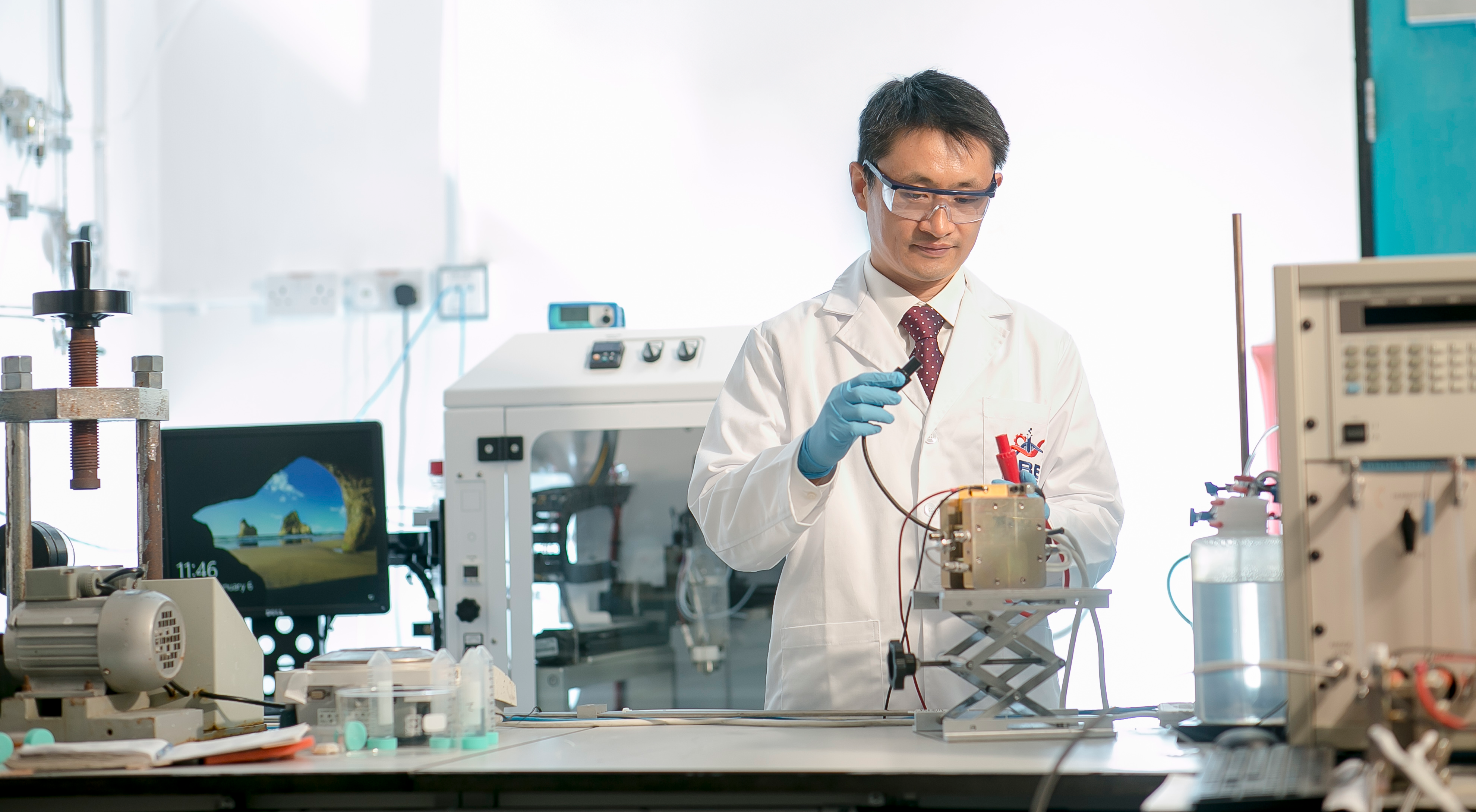
Prof. Shao’s productive impact as an internationally recognized researcher and Department Head is powered by his philosophy that “everything I do, I try my best to do well”.
Seizing opportunities, fueling happiness
In steering such changes so rapidly, Prof. Shao has called on his personal outlook on life. Rather than making a single grand plan that could prove unobtainable and lead to dejection, this approach centers on a readiness to take opportunities as and when they arise and then putting in maximum effort to ensure success. “I don’t set big targets for myself,” he said. “But everything I do, I try my best to do well. Then, when I have a chance, I will try to grab it – and if you try, you will be happy.” A stellar earlier career encompassing research and industry roles at the forefront of clean energy exploration is a further indication of his philosophy’s effectiveness.
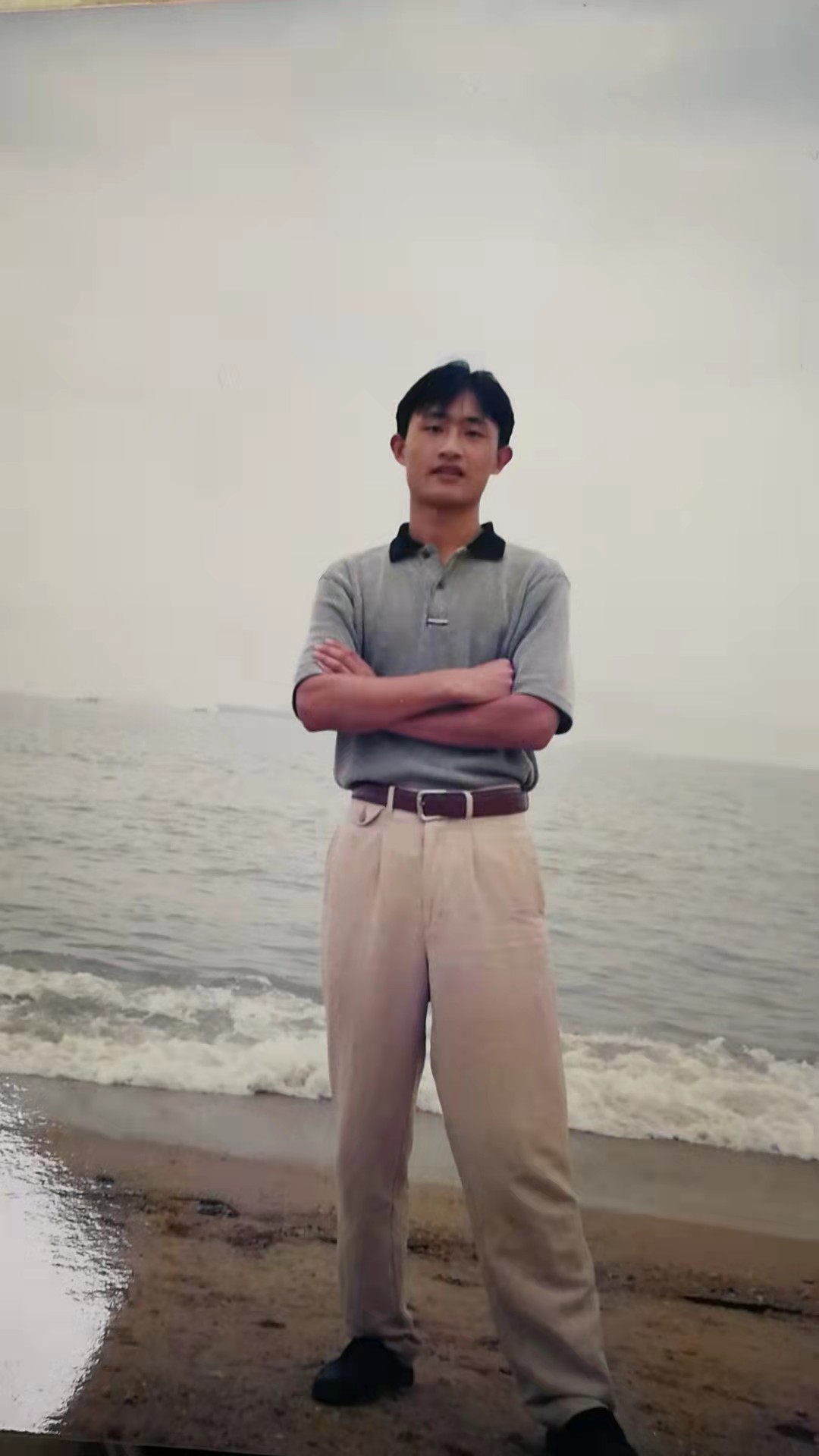
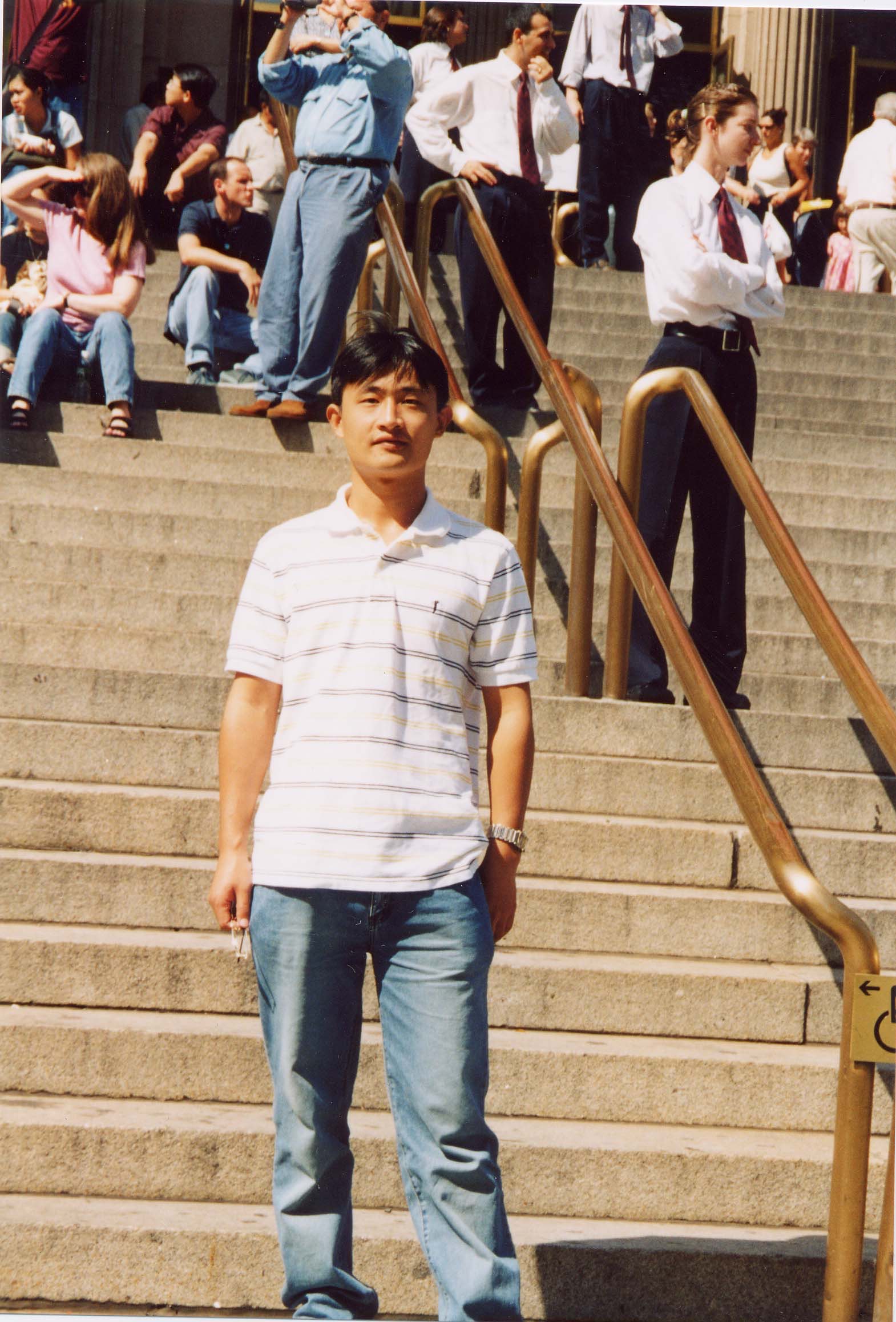
(Left) Prof. Shao in his undergraduate years at Xiamen University, at a beach near the campus.
(Right) Prof. Shao outside the Metropolitan Museum of Art in New York City, taken in his first year of doctoral studies at the State University of New York at Stony Brook.
As an undergraduate at Xiamen University in Fujian, Prof. Shao studied chemistry, but during his master’s in Physical Chemistry, also at Xiamen, a passion for electrochemistry started to emerge after being randomly assigned research into metal corrosion and anti-corrosion. On graduation in 2002, he decided to “see what would happen” if he headed for doctoral studies overseas. What happened during his PhD in Materials Science and Engineering at the State University of New York at Stony Brook was a series of “chances” that Prof. Shao managed to grab. When unable to study corrosion due to his professor’s lack of funding, he switched to polymers. But finding this area held less appeal for him – “and if you are doing research, you really want to do research you are interested in” – after a year he proactively sought to transfer to Brookhaven National Laboratory, managed by Stony Brook for the US Department of Energy. There, his supervisor set him to work on some intriguing electrochemistry-related studies. “At the time, I wasn’t aware of this research area. I was just interested in electrochemistry as a whole. Whether a fundamental or practical research area, I didn’t mind as long as it was electrochemistry,” he said. The focus was electrocatalysis and materials at the early stage of the hydrogen economy.
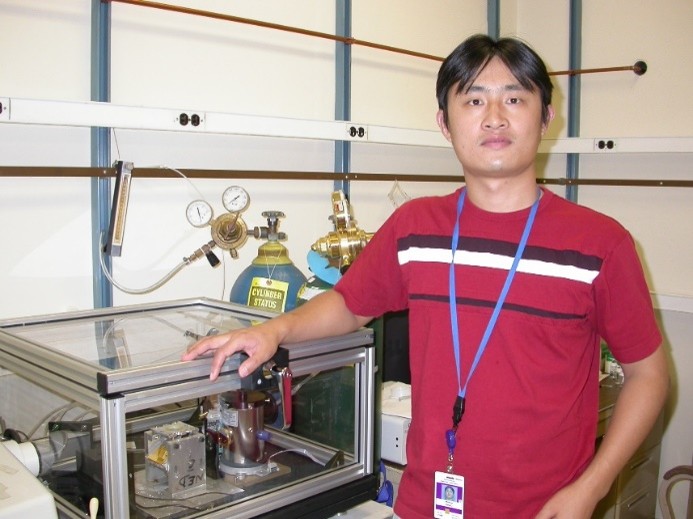
Prof. Shao at Brookhaven National Laboratory in the US in 2006, following graduation from doctoral studies and alongside the infrared spectrometer frequently used during his PhD.
On the move in industry and academia
After graduation in 2006, he gained another of his “chances”, moving from Brookhaven to UTC Power, the oldest fuel cell company in the world, on the recommendation of his PhD supervisor. Then, right after joining, he was appointed team leader of a multi-year collaborative project with Toyota Motor Company due to the former leader having a baby. This next life-changing opening resulted in a meteoric ascent at UTC Power, a subsidiary of Fortune 500 company United Technologies Corporation and the supplier of fuel cells for NASA’s space missions as well as fuel cell buses and stationary power plants. There, Prof. Shao became the fastest promoted engineer in the history of UTC as a whole, going from fresh engineer to Technical Fellow within five years. He also gained invaluable experience in team supervision, management, and communication, as well as working with other industry and university collaborators. In 2013, he switched to Ford Motor Company to extend his experience to lithium-ion battery electro-vehicles, spending a useful year discovering the core issues and problems facing the EV industry at that milestone time.
However, by then he was already thinking about a return to academia. “I have a lot of ideas, I want to try, but in industry, you don’t have that freedom because everything you do is to fulfill the company’s goal.” He looked at friends in US academia, who seemed highly stressed and consumed with research proposal writing, and decided it was not for him. Prof. Shao had already heard of HKUST’s high standards. In 2013, he ran into an academic friend from the Mainland in Boston, who had previously spent time as a visiting professor at CBE and enjoyed it. So when an opening appeared on the HKUST website, he decided to apply. In 2014, he and his family moved to Hong Kong.
Prof. Shao’s fast-rising career in industry was then echoed at HKUST, where he arrived as an untenured Associate Professor and moved up to endowed Chair Professor and Director of the HKUST Energy Institute by 2022. Beyond the satisfaction of the fuel cell and battery achievements of his research team, the all-round high-flyer has been recognized for his outstanding teaching, as well as his contribution to the field, being elected a Fellow of the eminent Electrochemical Society in 2023. He has also taken the first steps to entrepreneurship with a fuel cell catalyst start-up called Guangzhou Padergy New Energy Co Ltd. Established in 2023, Padergy now has over 10 employees and has secured its first round of investment. A second new business related to batteries is being planned. Yet somehow, on top of all his responsibilities, including two daughters, Prof. Shao still manages to find the bandwidth for running in marathons and playing other sports, including soccer, tennis, badminton, and squash. “I enjoy this time very much because it is your own,” he said. “And, of course, sport is sometimes competitive so any achievement or improvement gives you joy.”

Prof. Shao (top photo, center) enjoying time out from his packed schedule as an educator, researcher, departmental leader, entrepreneur, and family man to join CBE students at the departmental year-end party; and on the football field (bottom photo, center).
Carbon-neutral outlook
Looking to future sustainability overall, Prof. Shao is confident that cleaner energy across transportation is now close in Hong Kong. He points to the arrival of a hydrogen-powered Citybus, and notes discussions about electric ferries. At HKUST, he is happy to see front-running emissions initiatives such as University’s Net-Zero Action Plan 2045. Meanwhile, at the big picture level, he feels the UN Sustainable Development Goals and projects are a good way of bringing the myriad aspects of a resource-friendly world together. “Whether we can achieve this, I cannot tell, because not all countries are working toward the same goal. I would say it will be difficult, but there’s obviously progress.”

